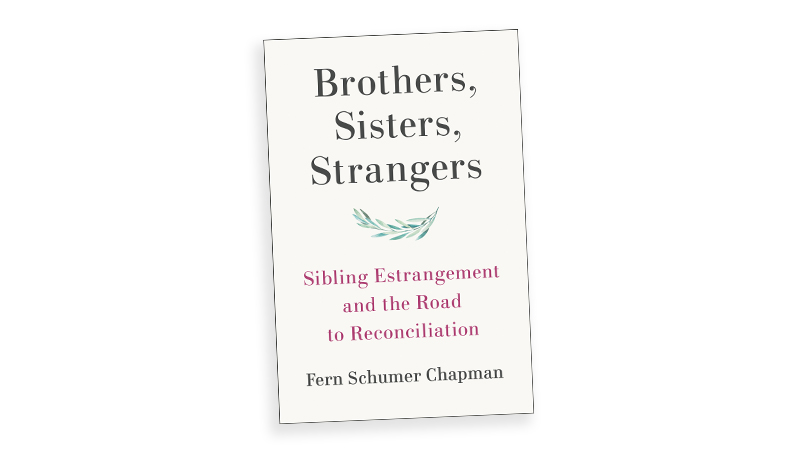‘Brothers, Sisters, Strangers: Sibling Estrangement and the Road to Reconciliation’
Q&A with author Fern Schumer Chapman

Author Fern Schumer Chapman knows her subject firsthand. Her book, Brothers, Sisters, Strangers: Sibling Estrangement and the Road to Reconciliation, reflects her personal experience as well as a wealth of scholarly research and the experiences of others.
Too often, self-help books lack an empathetic author. Consider the gregarious entrepreneur who claims his advice can make you rich, like him. Or the fitness guru who has never struggled with extra pounds or lethargy. Fern Schumer Chapman’s 40-year emotional separation from her brother, Scott – her only sibling – led her to write a book that blends memoir with research and guidance.
Each chapter begins with Chapman’s story of rebuilding a relationship with her brother. Then she highlights a relevant aspect of sibling estrangement. She uses research and words from experts on family studies and behavioral science. She also digs into stories from other people who have been estranged from brothers and sisters.
“Our culture has avoided and neglected the sensitive subject of sibling estrangement, which can start with a brief silence and turn into years and decades of cutoff,” Chapman writes. “The estranged are a large, undisclosed group – one that’s not easily measured. Specific numbers are nearly nonexistent, in part because people are often reluctant to admit they are estranged from a brother or sister. Despite the lack of hard data, some researchers believe that sibling estrangement is grossly underreported, and the phenomenon is epidemic.”
Nor are there rules for maintaining family ties. “In today’s cultural environment, where the family structure has transformed from an interconnected, extended nuclear group into a smaller, decentralized, loose network of relatives,” she says, “sisters and brothers often lack clear guidelines for their relationships.”
Brothers, Sisters, Strangers: Sibling Estrangement and the Road to Reconciliation begins with the importance of sibling relationships and moves through the grief of emotional separation, issues of reconnection, challenges of mental illness and addiction, irreparable splits, repercussions for the rest of the family, and practicalities to be faced after reconciliation.
And the book ends with an afterword from the brother, Scott Schumer. “I hope our story holds out the possibility – even for brothers and sisters who have been complete strangers to each other for decades – that they, too, might return by the road they came.”
How do people typically react when someone mentions that they are estranged from a family member?
Few friends or family members unacquainted with the experience truly understand the depth of this hurt, and even fewer want to talk about it. Some have their own anxieties, fearing that merely engaging with the topic might usher in an estrangement in their own lives and they, too, might one day be left lost and alone.
Most of us suffer in silence, isolated twice: not only from our sibling but also from social support against the loss. At the same time, whenever I tell people that I am working on a book about sibling estrangement, they sit up a little straighter and lean in, as if I’ve tapped into a dark secret. Those who haven’t experienced this loss likely know someone who has, and they welcome insights to understand it.
Why does it matter that people stay connected with family?
Humans have a deep need to belong. The eminent psychologist Abraham Maslow identified this crucial need in his “Hierarchy of Needs,” a color‐coded, weighted pyramid of basic human requirements. The need to belong – whether through family, friendship, shared interests, or sexual intimacy – ranks just after the essentials: food and water, shelter and sleep, physical safety. Like these fundamentals, the human need to belong is lifelong.
Absent a sense of belonging – this feeling of emotional safety and context – people come to fear that their very lives are at risk. They lose the ability to trust and connect with others, instead becoming consumed by the task of surviving alone. The family – that original constellation of relationships – offers an opportunity to belong to a group and a chance to develop deep, lifelong connections that may transcend the transient nature of our existence.
Do you think there are times when it’s appropriate to disconnect?
Absolutely, even though estrangements are stigmatized and inculcate a sense of failure, some relationships are simply too toxic to sustain. When the family member is consistently treating you in an abusive manner – being disrespectful, ignoring boundaries, gaslighting – it may be time to access the toll the relationship is taking on your well-being. When you don’t feel safe or supported and nothing positive is gained from the relationship, it may be time to cut ties.
Do you see siblings growing apart after the parents pass away?
Yes, there are several perilous moments when a sibling relationship may be at risk. They include:
- Adolescence: A teenage sibling, individuating and creating his or her own identity, leaves home for college or a job. He or she may change the established sibling relationships and dynamics in the family.
- Marriage: A new brother- or sister-in‐law may seek to reduce and/or control the couple’s involvement with one side of the family.
- Birth of a baby: As a sibling focuses on his or her new family, some family members may feel abandoned or betrayed. Siblings may even compete with each other through their children.
- Divorce or illness: The physical, emotional, and financial responsibilities of helping a sick or divorcing family member may overwhelm one sibling, creating resentment at an unevenly shared burden.
- Parental illness, death, or inheritance: Siblings may stage a last-ditch competition for power, love and family loyalty. Conflicts arise over health care and payment for an elderly parent, as well as inheritance of family treasures and assets.
In my survey, most people who were estranged from a sibling identified the last category as the catalyst for their cutoff.
Ask Amy: Daughter’s marriage leads to estrangement
Does ‘Brothers, Sisters, Strangers: Sibling Estrangement and the Road to Reconciliation’ have guidance for families who aren’t completely estranged but have only a nominal, superficial family bond?
Yes, this “nominal, superficial family bond” or what I call a “limited relationship” requires that a sibling lowers expectations and keep strong boundaries. Here are some other suggestions:
- Seek common ground in shared experiences and memories to rise above differences.
- Avoid contentious topics. If you find your family member’s politics offensive or you are hurt by exposure to family pictures and comments, restrict, or block social media accounts.
- Have an exit strategy when conversations become tense.
How does social media affect estranged relationships?
When navigating the world of social media, the estranged need to be cautious and weigh the potential for reconnection against the risk of worsening familiar feelings of grief and anguish. After assuming the risk of “friending” or following distant family members, the aggrieved sibling may be re-exposed to the ugliness of relatives’ gossip, distortions, false posturing, and exclusions. At any moment, a user could run straight into social media’s ultimate slammed door: being blocked. For the estranged, this constitutes yet another hurtful and disturbing rejection.
Even worse, estranged siblings who haven’t accepted the severed relationship may find themselves hurt again and again in social media exchanges with relatives. Exposure to an estranged sibling’s posts, “likes,” comments, and photographs, whether direct or indirect (through a relative’s or mutual friend’s feed), can be like picking at scabs, preventing emotional wounds from healing and inhibiting the grieving process.
Social media displays an even darker side when feuding relatives use the platforms as another battleground on which to wage war. Aware that a disowned family member is watching, some will intentionally post hurtful entries, consciously heightening bad feelings between themselves and their estranged sibling. Some bail out of this cruel game by blocking all family members from their social media accounts.
The estranged who are hoping for some sort of reconciliation on social media often are disappointed, partly because of the nature of the medium. People treat one another differently online than they might in a face‐to‐ face encounter. Social media has a quality of remove; it is less personal, and users don’t worry as much about hurting others’ feelings. Social media just isn’t conducive to an in‐depth conversation, especially the kind of discussion that might lead to healing of a troubled relationship.
Have you spoken with people who have experienced family estrangement because of the divided political climate of the past few years? Do you have suggestions?
Yes, this situation is more common than ever. A blunt social media post, a slip on the family text thread, a careless remark during a holiday celebration – the smallest offense can shatter a sibling bond made brittle by intense political partisanship. The extreme politics of recent years have placed tremendous stress on family members. After all, beliefs are built on values, and some family foundations have cracked around political fissures. The pandemic has exacerbated the divide, as wearing a mask, getting a vaccine, and assessing the risks of Covid have become intensely politicized.
Some have discovered that it’s best to simply step away from these relationships at this time. The divides are too great. However, for those who wish to maintain relations, I would encourage your readers to consider some of my suggestions for a limited relationship [see above].
At holiday gatherings, they should observe a moratorium on politics. Raised voices, profanity, and personal insults all bring immediate shut-down: “This is not who we are or what we do. We are not that kind of people.”
Those who are cut off due to politics might write an email to estranged relatives, emphasizing their desire to reconnect, and proposing parameters for their relationships – i.e., banning certain topics. To encourage a dialogue and to draw up a relationship contract, family members might ask their difficult relatives for suggestions on how the family can be together.
On the road to reconciliation, how does a person get past the hurt and distrust that has built up?
Both parties must be willing to rebuild the relationship. First, ask yourself these crucial questions:
- Why is this relationship important to me – not to my family or to anyone else but to me?
- Does my family member want to resume a relationship?
- Can I set aside the anger, pain, and/or resentment that led to the
break to change our pattern of relating? - Will I compromise too much of myself if I try to sustain a relationship with my difficult family member?
If siblings should decide to try to rebuild their relationship, they can gain understanding by:
- Sitting down together, face to face.
- Listening without interrupting, without challenging each other’s stories. The one goal is to seek understanding. Experts agree that reconciliation is impossible without true, genuine listening.
- Acknowledging, with empathy, the other person’s hurt, anger, or alienation. Giving them the benefit of the doubt; assuming they have sincere, trustworthy intentions. When each party accepts both parties’ experiences, neither feels devalued or shut out.
- Stressing and acting on your willingness, desire and hope to create a mutual bond.
- Letting go of anger.
Brothers, Sisters, Strangers: Sibling Estrangement and the Road to Reconciliation, by Fern Schumer Chapman
Viking (April 6, 2021)


